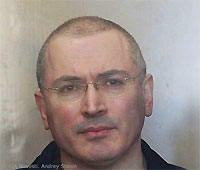Khodorkovsky and the Tsar: Why Putin’s pardon of his top foe doesn’t tell us anything that we didn’t know already

(Moscow News – themoscownews.com – Anna Arutunyan – December 21, 2013) I don’t know quite how to say this without diminishing the importance of the incomprehensible inner trial that a Russian man undergoes in a Russian prison for amassing his own power and using it to defy the Russian state. First of all, I am sincerely happy that former oil tycoon Mikhail Khodorkovsky, by grace of a stroke of Vladimir Putin’s pen, was freed after spending a decade in prison. I’m happy for his mother and for his children, who grew up in the decade while their father was in jail. I hope the meaning and inner freedom that he has discovered in prison will also bring him peace.
The rest the supposed political implications of the release of Putin’s number one foe from jail doesn’t tell us anything that we couldn’t have figured out already. And it shouldn’t automatically transform Khodorkovsky into a hero.
As many have already written, Putin’s clemency, revealed after Thursday’s marathon press conference in an off the cuff comment that made a journalist’s eyes bulge, doesn’t change anything. If Friday’s circus – Putin’s decree explaining that Khodorkovsky had asked for a pardon and Khodorkovsky’s immediate release showed us anything at all, it’s that there’s really only one answer to the “why” of any of Putin’s actions, and it’s only three words long: Because he can.
Observers clearly got the message. “It was the gesture of a tsar,” Tatyana Lokshina of Human Rights Watch told me, adding that a tsar can execute or dispense mercy at will. Most importantly, the pardon, as Carnegie Center’s Lilia Shevtsova wrote, was not an indication of a political thaw, but the “confirmation of the omnipotence of one man… and the reflection of the fluctuation of his moods and whims.”
So why was this manifestation of the tsar’s infinite mercy a bombshell? Why, in other words, are we surprised?
The fact of the matter is, not only has Putin’s clemency not changed anything, it is, in and of itself, merely part of a status quo that has actually predated Putin.
The best testament to that is Khodorkovsky himself. In 1998, several years before Putin came to power, Khodorkovsky told journalists that he doesn’t own anything; he merely rents it from the government – the dominant force in the economy.
To understand what he meant, we merely need to remember how Khodorkovsky acquired the Yukos oil company. Long before he had become Russia’s richest man and turned his corporation into a paragon of efficiency, he had started with a Soviet industrial asset that was granted to him by the state as part of the loans for shares program. Developed in 1995 by a group of oligarchs, the program had a bunch of bankers – Khodorkovsky included – bail out Boris Yeltsin’s cash-strapped government with loans. Oil and minerals companies were given to the oligarchs as collateral. Given the understanding that the government would never be able to pay back the loans, it was pretty much a privatization on the cheap from the very beginning.
Considering the manner in which Khodorkovsky acquired his oil empire, he must have understood that the government could take it back any minute. It was just a matter of who was stronger: the Kremlin or the oligarch. When, in 2003, he violated Putin’s unwritten pact forbidding oligarchs from dabbling in politics, he must have believed that he was still stronger than the Kremlin. He ended up in prison not because he broke the law, but because he miscalculated his own strength.
To show who was stronger, the Kremlin jailed him. Putin, meanwhile, has made it pretty clear that Khodorkovsky could apply for a pardon any time he wished because by doing so he would be admitting and accepting his guilt.
The clemency, then, was that final demonstration of the Kremlin’s strength. And while I respect Khodorkovsky for fighting two ponderous economic fraud cases and have a great degree of reverence for what he has gone through, all that does not make Khodokovsky into a moral authority figure.
